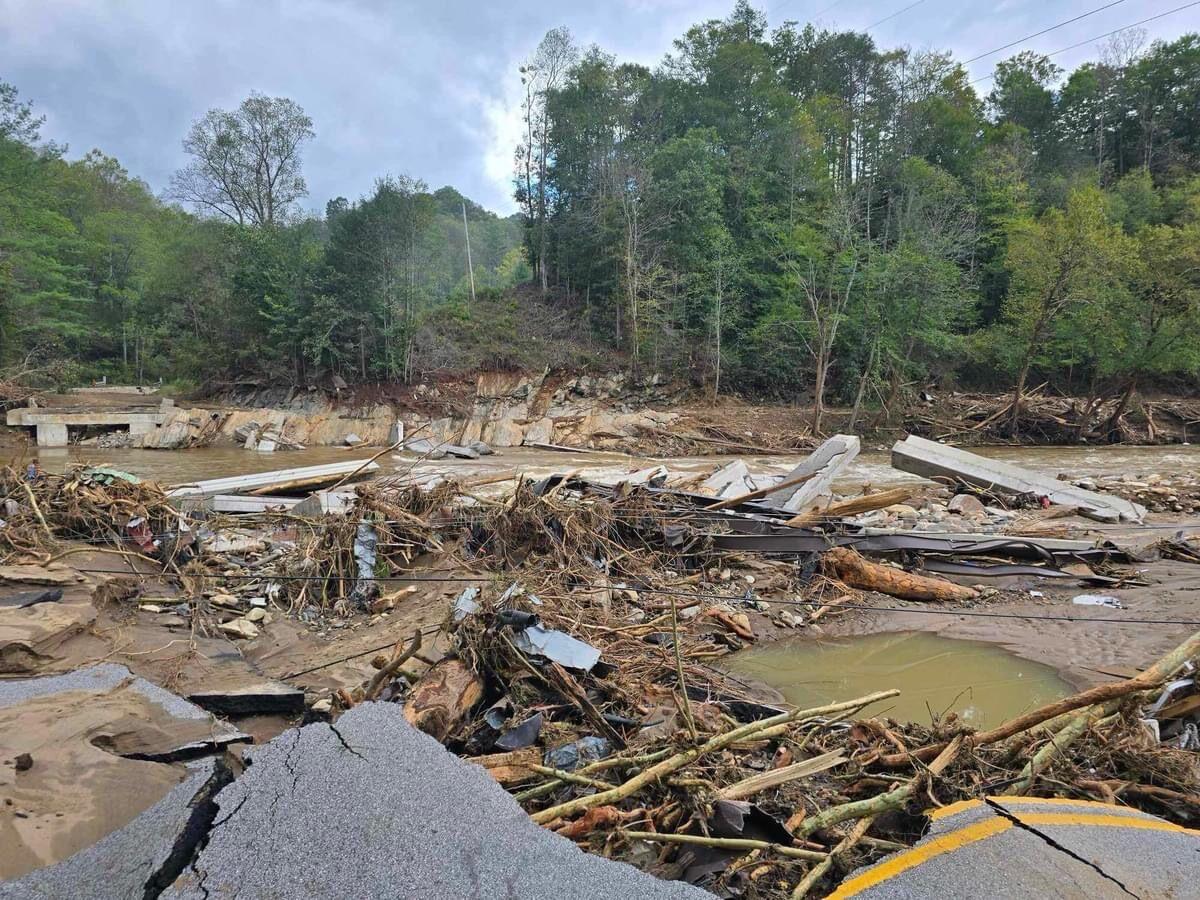Hurricane Helene brought mass devastation to western North Carolina, flattening entire towns in its wake. Spruce Pine is just one of several towns in the western part of the state recently affected by the record-breaking floods.
Located a few miles from the Blue Ridge Parkway, Spruce Pine is a small town with a strong community. It’s also where Tyra Frye, a fourth-year studying English and women’s, gender and sexuality studies, grew up.
Frye said the devastation could be seen from the 10-foot floodwaters downtown to her own neighborhood.
“Our neighbor’s house is completely gone,” Frye said. “There’s multiple neighbors on our street that don’t have homes to go back to, or even any remnants of a home, you just see the foundations of homes, sitting there. And it’s kind of like a memory of what was once there.”
Frye’s mother’s home also flooded, but her neighbors helped her mother escape the fast-moving water to higher ground. She has now evacuated and is safe.
Despite the complete devastation, communities in Spruce Pine and other affected towns are coming together to support each other.
“The community is really taking care of each other, which is, I think, something that’s beautiful about it,” Frye said. “My mom said that, after the flood, the neighbors brought her breakfast and they walked across what was left of the bridge. And someone who lives above her brought her a portable phone charger because they knew that she was sleeping in a house without power that was covered in mud.”
Frye also warned that the devastation of Spruce Pine could have global implications. The town is one of the only places in the world producing high-quality quartz used to make semiconductors. Semiconductors are the basis for most electronics and are necessary for technological products like mobile phones and laptops.
“It’s sad that you have to talk about — like the thought of what we exploit from the area is what is most important about it, ” Frye said. “But it’s important also to let people know that this isn’t just an isolated event. It could potentially have global impacts, especially on our technology.”
As the floodwaters recede, hundreds of people are still missing. For those who have been able to get reception, social media is being used to locate family members, assess the damage of nearby towns and stay up to date on future weather patterns.
Ethan Clark, a fourth-year studying environmental science and meteorology, runs the North Carolina Weather Authority, which reports the state’s forecasted weather on Facebook, Instagram and his own website. He started the page when he was in seventh grade.
Since Hurricane Helene, Clark has been reporting extensively on rural communities hit hard by the storm, documenting the devastation and passing along news sent to him by his followers.
Before the hurricane hit western North Carolina, Clark was sounding the alarm for Southern Appalachia. While other media outlets focused on Florida, where the hurricane was projected to hit as a Category 4, Clark was warning North Carolinians that there would be widespread, life-threatening flooding.
“One of my big things was, ‘Don’t focus on the cone, focus on the impacts,’” Clark said. “And that was a very hard messaging struggle. I even sat down and spent probably six hours trying to figure out how to message, ‘Don’t look at the cone.’ And apparently some people said it worked, because someone, like one lady, said she convinced her family to leave.”
Frye also heard from her community in Spruce Pine that it was specifically Clark’s messaging that allowed some people in her town to evacuate successfully.
The North Carolina Weather Authority’s Facebook has amassed over 550,000 followers, reaching an age demographic of 25-65 year-olds.
Clark said one of the biggest goals of the page is to keep things personal, responding to comments and focusing on rural communities that get less media coverage. As a result, Clark started receiving information from followers about the status of towns like Chimney Rock and Old Fort, as well as Mitchell, Avery, Yancey and Ashe counties.
As many individuals in these areas still have no cell service or internet, there have been rumors that another hurricane is projected to hit western North Carolina. Clark said this is misinformation.
“In the future, we’re heading into a drier period for the next week or so, lots of sunshine,” Clark said. “There’s been a lot of misinformation about another hurricane. At this point, there is not a current forecasted hurricane. There was a TikTok that basically had the same cone and people were trying to profit off hype, because people are scared and nervous. It was probably sent to me a thousand times, like, ‘Is this happening?’ So I posted in all caps, because I just want to shut it down, because people are trying to take advantage of people.”
A week after Helene made landfall in western North Carolina, whole communities are assessing the damage while still living without necessities like food, water and a place to sleep.
To help individuals affected by Hurricane Helene, Student Government is collecting disaster relief materials in Talley 4251 for Triangle Mutual Aid. The American Red Cross and the North Carolina Disaster Relief Fund are also accepting donations.












